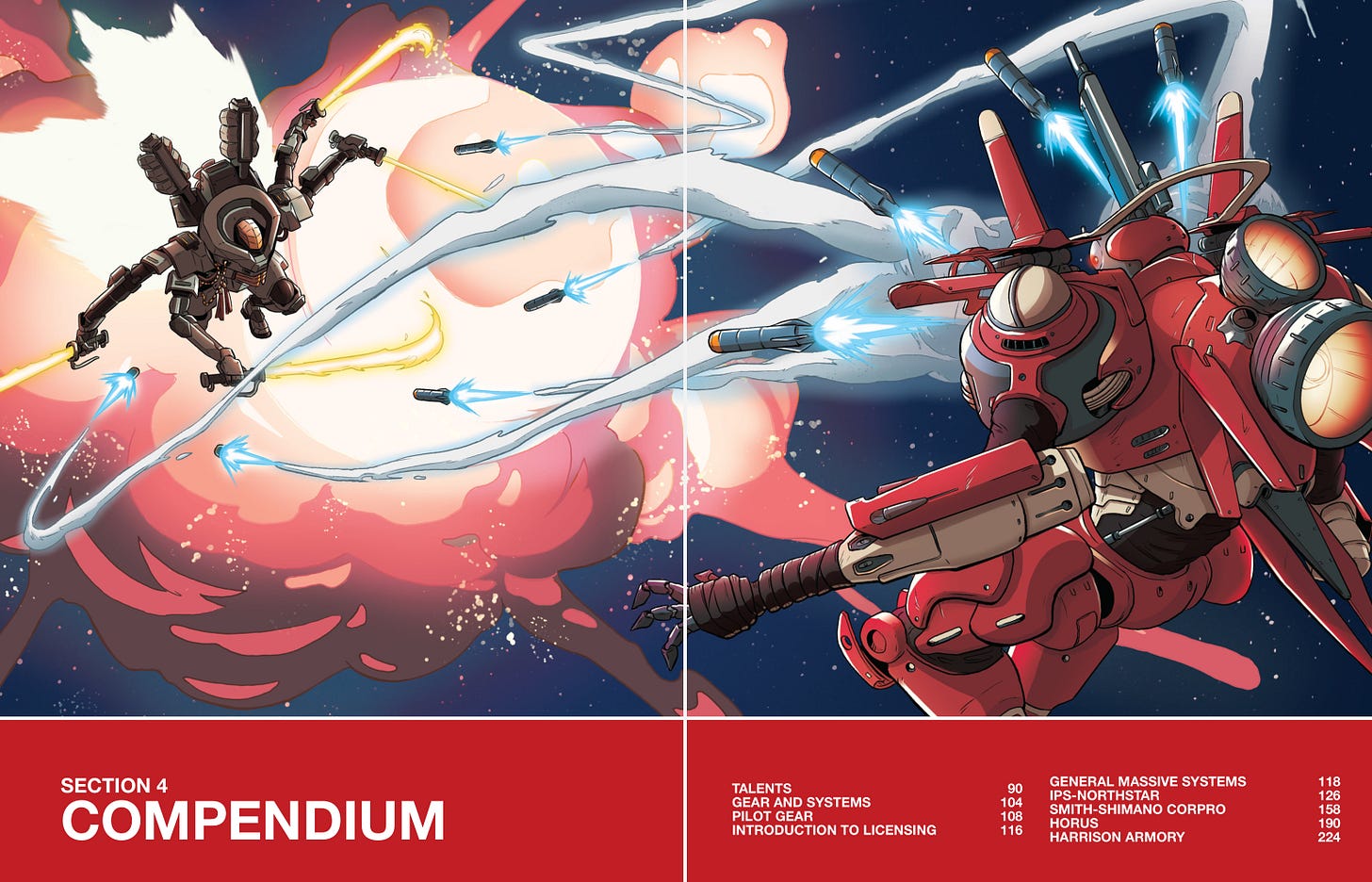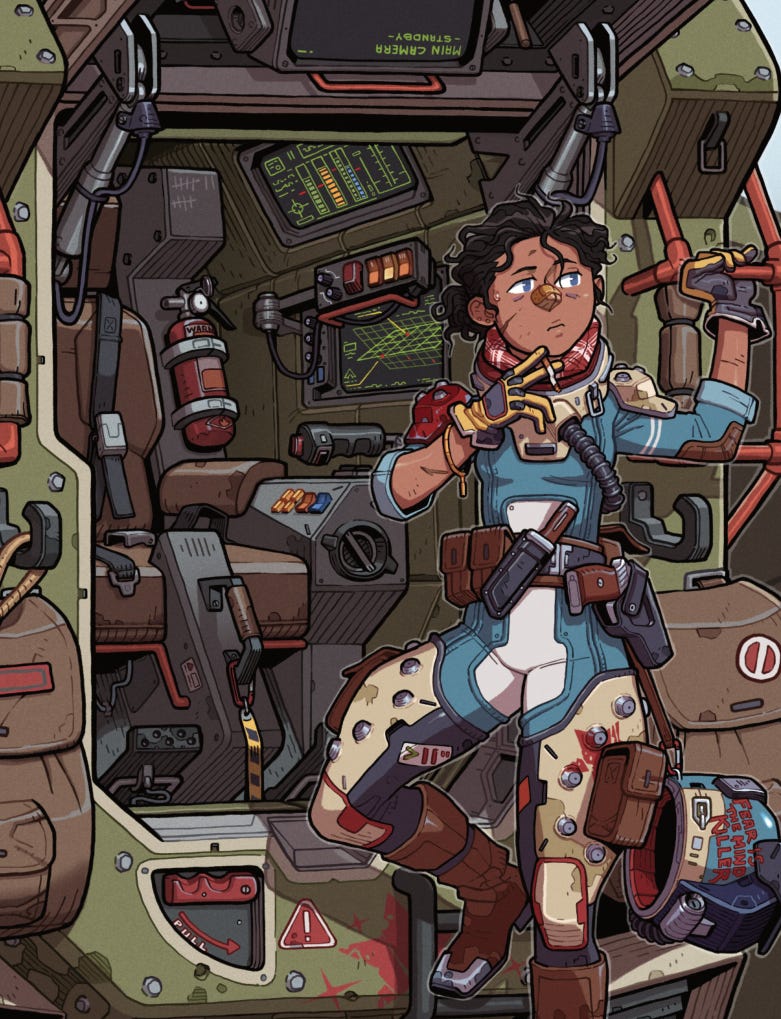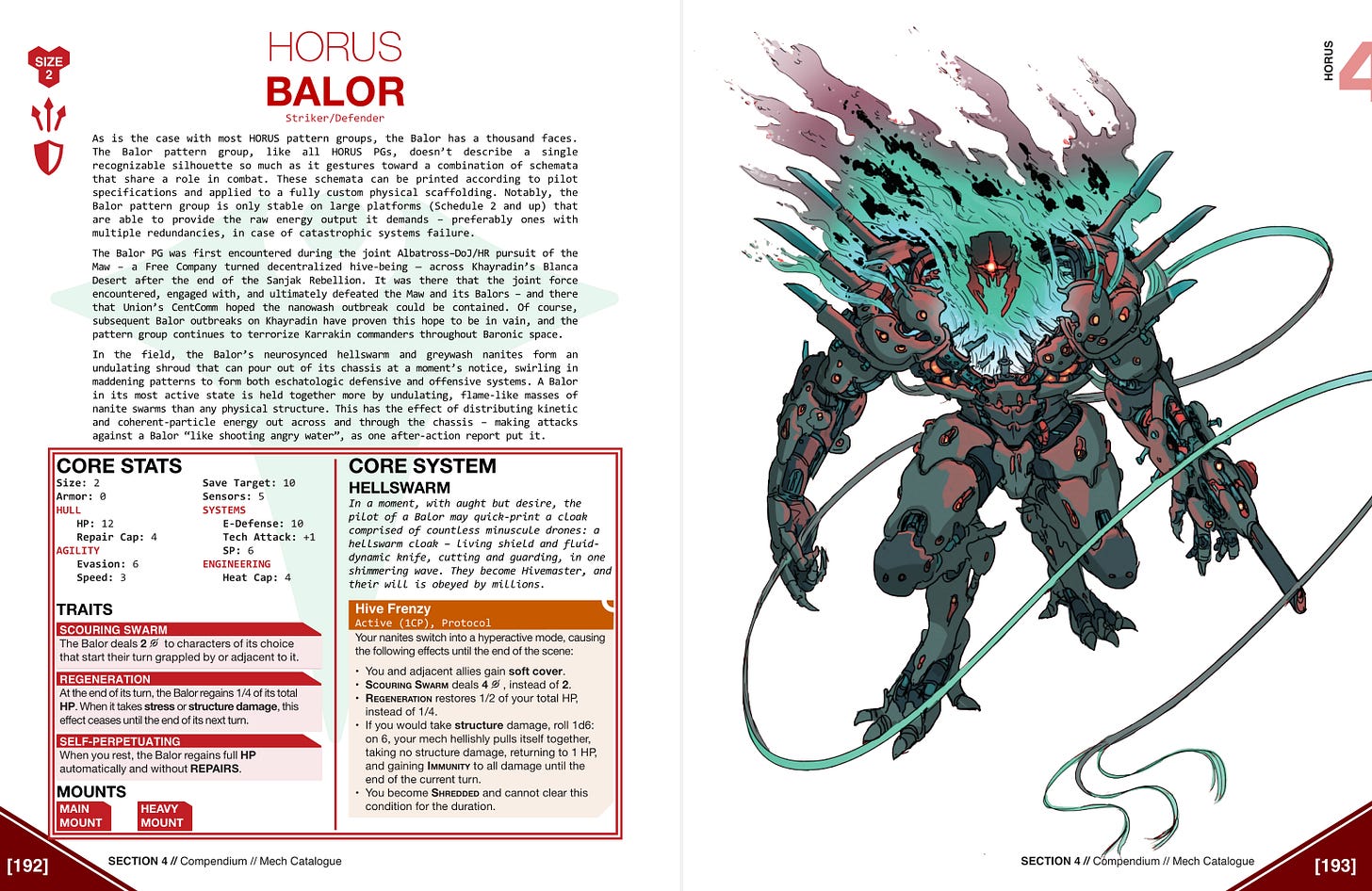From BATTLETECH to Lancer, a Look Toward the Future of Mech Roleplaying Games.
How Roll20 and a Crazy itch.io Bundle Filled the Vacuum of Mech Gaming in 2020
Until relatively recently, I never had a crew of buddies to play tabletop games with. I grew up in nothing but small towns, between Oregon and Texas, so my friendship options were pretty limited. Growing up in an extremely fundamentalist household didn't help, either. I'll never forget the time that my Nana found the binder of Magic: The Gathering cards that my older brother and I had been collecting. Being peak "satanic panic," her fierce Mormonism didn't take particularly kindly to that kind of thing in her house. So, like any rational person might do in that situation, she dead-ass threw the entire binder of cards straight into the actual fireplace.
So yeah, not a lot of opportunities for being one of the cool nerds with the nifty dice. But MAN, I sure wanted to. I'd always try to steal away to check out the comics and book sections of any store we were shopping in, thumbing through Forgotten Realms novels and comics whenever I could. I could never be caught holding on to any of it, though. I'd check out whatever books I could from the local libraries, and dove head first into as much of that good, high fantasy stuff that I could stuff into my little fledgling brain.
Fast forward a little while to my pre-teen years, and I had discovered a loophole. I still didn't have an avenue to actually play any of these cool dice games, but I discovered a medium through which I could still stoke my imagination without hiding it from my family. I discovered Mecha. I managed to, on a whim while shopping with my dad (visiting us in Texas from Oregon and spoiling us with stuff) at Hastings, our local hobby/book store. A certain book caught my eye. The cover looked like some kind of cross between a WW2 fighter plane, a tank, and a big stocky Gundam. The title read "BATTLETECH: THE FUTURE OF WARFARE," and I was caught hook, line, and sinker.
I took it home and, because we lived in small town Texas and just loved Jesus so, so much, the content including nothing but war and guns was totally ok for me to have. As long as there weren't any devils or elves, everything was gravy. I wore out the bindings on that book from how many times I flipped through it, looking at these awesome black-and-white illustrations of towering killing machines, with radical names like "Hellhound" and "Shadow Hawk."
Each page included an illustration, and a page of specifications, stats, and weapon loadouts. Knowing what I know now, this book was a "Technical Readout," meaning that it essentially existed as a compendium of new mech character sheets, for the purpose of adding depth to the existing Battletech war game. I was, at the time, completely unaware of most of the finer details of the wargame itself, but enough of it was explained in my book to let my imagination run wild. I would sketch out poorly drawn battle maps on my wide-ruled notebook paper, using the colored pencils that never actually touched any homework. I would consider the best possible combination of mechs to tackle any given situation, which was especially precious considering my complete and utter lack of understanding behind any of the weapons or gear listed in the book. Every day after school, in that beautiful hour and a half before mom came home, I would catch Gundam Wing on Toonami, and mess with my kick ass Battletech book.

Eventually, however, my interest in this single book waned like any pre-teen interest might. And, if we're all being perfectly honest, even the wildest imaginations can only get so much mileage out of pretending to play a game that you neither had a group nor a fundamental understanding of the game itself. What did stick around was my eternal love for mechs in almost any artistic medium. I've dipped my toes into at least some sort of mech game with every new video game generation since the PlayStation introduced me to Armored Core. But the fleeting desire for a tabletop experience never left my mind.
So fast forward a whole shit ton of years, and we arrive here in 2020. In the wake of the unprecedented civil unrest following the horrific murder of George Floyd, a massive group on independent game developers and content creators came together to release the biggest single bundle of content I've ever heard of. I bought it 3 times over, happy to donate to the heroic cause being represented, but also to share the sheer, unthinkable amount of love and effort inside this veritable treasure hoard. One piece of content immediately stood out from the pack. Scrolling through the thumbnails, page by page, I was stricken with that same feeling that hit me all those years ago. I was staring at a newly released, independently created RPG called Lancer, and it was love at first sight.
I wasted absolutely no time in transferring the PDF to our iPad, trying my best to read and comprehend the rules as quickly as I could. These days, I run with two separate tabletop groups, and I shared the book with both, desperately hoping that some of the raw enthusiasm I was feeling might rub off onto any of my RPG buddies. I volunteered to run a homebrew game, to figure it out as we go, just to finally experience what it feels like to mix the creative freedom of tabletop roleplaying with a genre that I've revered for so long.
Right off the bat, the book itself is fucking stunning to look at. The extensive art, created by 20 or so credited artists led by Tom Parkinson Morgan (of Kill Six Billion Demons fame), is just so goddamned rad. Someday, when my toddlers are no longer toddlers and learn to refrain from literally eating books, I plan on hunting down a physical copy just to see what it's like being in the same room as these images. I absolutely cannot overstate how well designed and gorgeous this massive, complex RPG is to just look at. The "mud and blood" grittiness of the mech genre combines exceptionally well with the far-future science fiction, and is tied together with a delightful 90's era anime twist. Seriously, just do yourself a favor and take a gander at some of the art.
The game itself ain't too shabby, either. My group and I are far from experts, but our little weekly romp in the silly homebrew campaign that I'm basically improvising hasn't even started getting old yet. Every time the players rank up their characters, they're met with layer upon layer of mechanical choice and freedom to create a completely unique play experience for each of them, even within the confines of the relatively chunky ruleset. This game strikes such an interesting balance between approachability and meta-game complexity, and as such really provides a uniquely enjoyable experience for players of vastly varying experience. And that isn’t me spewing game review platitudes. My group is a perfect microcosm of exactly the experiential variability that I just described. Three out of four of us have DM experience, and the best among us has managed to bring out the best roleplaying I've ever had the pleasure of participating in. One of us has only been playing RPG's since this summer. Two of us have a long standing history and love for mech RPG's, and one of us is learning to fly actual airplanes and loves to role play some level of aerospace-oriented science fiction nitty-gritty. And, assuming they aren't all just straight up lying to me about it, we're all having a fucking terrific time exploring this space (pun intended) together.
What I find most interesting, aside from the endless theory crafting and mech building, is the mixture of game play styles at work here. We have a lovely mix of d20 style dice rolling mechanics, but it's implemented in two, very separate and very different ways. First, in what the book refers to as "narrative play," the characters roll a d20 for any and all skill checks that they might employ at any given moment. While this sounds exactly par for the course, the d20 system here actually borrows more from the "Powered by the Apocalypse" style then it does from D&D. Instead of using a set "Difficulty Challenge (or DC)," the success of failure of each check is measured on a sliding scale, with certain talents or triggers granting flat bonuses to the result. This is combined with a narrative structure that is much more player driven, with the game master acting as more of a referee and improvisational force then a malevolent dungeon overlord. The way the system cleverly avoids pitting the game master against the players in narrative play lends a genuine sense of alacrity to a game that is, by all intents, quite violent in its nature.
Speaking of violence, there's a whole other, much more complicated side of this game to touch on. The reason we're all really here in the first place. This system is great. It's chunky, it's complicated, and it's a mile wide and a mile deep in all the right ways. This side of the game has a whole lot of what a d20 system does right, tactical combat. A comparison that I've seen thrown around here and there lines this system up roughly with 4th edition D&D. I can see the where those parallels come from, and while the basic combat loop might share a similar feel, the sheer freedom of the Lancer system sets it completely apart from anything else I've personally looked at. In Lancer, instead of traditional RPG levels ,players are granted what are known as "License Levels." In a more traditional game, every level gained progresses you down a set path of your choosing, with little baseline mechanical customization available to the player. In Lancer, however, the player is free to pick and choose almost any weapons, systems, and mech frames they feel like. Every mech frame has 3 license levels' worth of progression built into them, so a player can dip into all sorts of fundamentally different frames to craft their build as uniquely as they see fit. I, for one, have personally written off several hours of times just thinking about weird, and almost certainly suboptimal, combinations just for shits and giggles. This variability in playstyle blends in perfectly with the familiar, comfortable feeling of classic d20 style combat. My group started as a D&D group, so the relative familiarity with the pace and cadence of battle gives this system legs that I'm not sure would be there with a 2d6 style system.
This thing is running long, and I could rattle off a whole bunch more pages of paragraphs about Lancer. But I really wanted to convey this one, simple message here. This game sparks a joy that I haven't felt since I was a goofy chubby kid, staring at a book about cool robots. It's goddamned near impossible to spell out exactly what that feels like, so I really think that you should do yourself a favor and check this thing out for yourself. And, if you have the means, please consider supporting such a talented team of independent creators. They certainly earned it.












